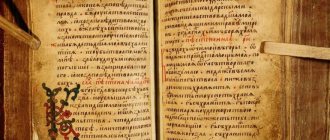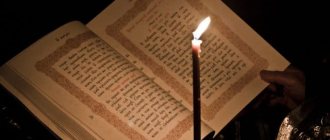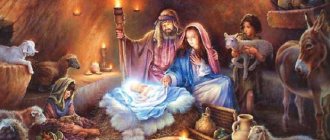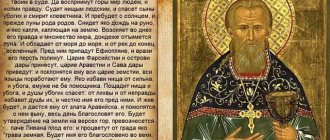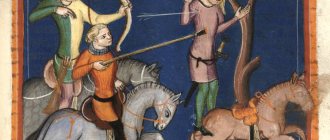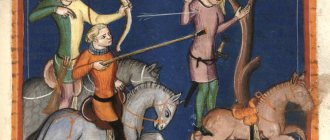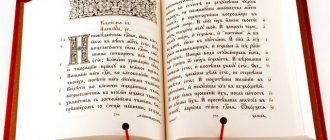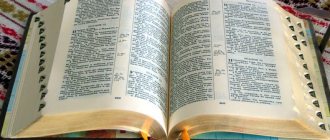Text of prayer Psalm 78
In Church Slavonic with accents
Psalm to Asaph
1 O God, the Gentiles have come into Your possession, and have desecrated Your holy temple,
2 You have laid Jerusalem as a vegetable storehouse, and you have laid the carcases of Your servant for the birds of the air, the flesh of Your servants for the beasts of the earth.
3 You shed their blood like water around Jerusalem, and you shall not bury it.
4 This resulted in reproach from our neighbors, imitation and reproach from those around us.
5 How long, Lord, will you be angry to the end? Will your zeal kindle like fire?
6 Pour out your wrath on tongues that do not know you, and on kingdoms that you have not called upon your name,
7 For Jacob was devoured, and his place was laid waste.
8 Do not remember our first iniquities: let Your compassions soon precede us, O Lord, for we are so poor.
9 Help us, O God, our Savior, for glory in Your name, Lord, deliver us, and cleanse us from our sins in Your name.
10 Let it not be when the heathen cry, where is their God? And may the vengeance of the shed blood of Thy servant be known before our eyes.
11 Let the groaning of the chained come before You, according to the greatness of Your arm You will supply the sons of the slain.
12 Repay our neighbors sevenfold into their bosom for their reproach, who has reproached You, O Lord.
13 But we, Your people and the sheep of Your pasture, have confessed to You, O God, to forever, to generation and generation, we will proclaim Your praise.
In Russian
Psalm of Asaph
1 God! The pagans have come into Your inheritance, they have defiled Your holy temple,
2 Jerusalem was reduced to ruins; They gave the corpses of Your servants to be eaten by the birds of the air, the bodies of Your saints to the beasts of the earth;
3 They shed their blood like water around Jerusalem, and there was no one to bury them.
4 We have become a laughing stock among our neighbors, a reproach and a disgrace to those around us.
5 How long, O Lord, will you be angry forever, will your jealousy burn like fire?
6 Pour out Your wrath on the nations that do not know You, and on the kingdoms that do not call on Your name,
7 For they devoured Jacob and made his habitation desolate.
8 Do not remember for us the sins of our ancestors; May Your mercies soon precede us, for we are very exhausted.
9 Help us, O God our Savior, for the glory of Your name; deliver us and forgive us our sins for Thy name's sake.
10 Why should the Gentiles say, “Where is their God?” May the vengeance for the shed blood of Your servants become known among the pagans before our eyes.
11 Let the groaning of the prisoner come before You; By the might of Your arm save those doomed to death.
12 Restore to our neighbors seven times into their bosom the reproach with which they reproached You, O Lord.
13 But we, Your people and the sheep of Your pasture, will praise You forever and proclaim Your praise to generation and generation.
Interpretation
The author briefly mentions the destruction of the temple in Jerusalem, but pays close attention to the suffering of the Israelites.
To better understand the deeper meaning, you must break down the interpretation of Psalm 79 for each verse:
- Verses 5-7: Understand that everything that has happened is a sign of God's righteous wrath, but it is time to turn it on the Gentiles. They do not know the Lord and deliberately refuse to believe in Him.
- Verses 11-12: The psalmist prays to the Lord to hear and save those condemned to death. He asks seven times to repay the enemies for blasphemy against the Lord.
- Verse 1: The author talks about the Gentiles invading Jerusalem and turning it into ruins.
- Verse 13: The Psalm ends with an oath to glorify the Creator in future generations.
- Verses 2-4: The confrontation was terrible, blood flowed like a river. Unburied corpses of Jews are everywhere, they are attacked by vultures and wild beasts. The psalmist is pained that his pagan neighbors mock the pain of his people.
- Verses 8-10: The author admits that everything that happened was a punishment for sins. He appeals to God's compassion and prays for His forgiveness. The time has come to silence the mocking pagans and, by avenging the shed blood, prove to them our existence.
History of writing
The text of Psalm 78 tells of a great national catastrophe - the fall of besieged Jerusalem on July 18, 586 BC. The Babylonians, with the help of military vehicles, made a hole in the wall, and the army burst into the city, whose inhabitants were weakened by a long siege. August 28, 586 BC Jerusalem was sacked and burned, including Solomon's Temple. The surviving inhabitants were driven into Babylonian slavery. Most likely, the author was an eyewitness to this disaster. He is one of those who were not carried away to Babylon. The psalmist expresses the events that happened.
78:1-3 Psalm of Asaph. God! the pagans have come into Your inheritance, they have desecrated Your holy temple, they have turned Jerusalem into ruins; 2 They gave the corpses of Your servants to be eaten by the birds of the air, and the bodies of Your saints to the beasts of the earth; 3 They shed their blood like water around Jerusalem, and there was no one to bury them.Asaph appeals to God with a complaint against the pagans: the soldiers of Babylon came to the camp of Israel and filled the courtyards of the temple in Jerusalem. Moreover, it was burned and destroyed. Despite the fact that Judea was punished for the wickedness of those who apostatized from God, not only the apostates suffered in the punishment for apostasy, but also God-fearing Jews, saints and servants of God. Their blood is shed around Jerusalem, and there is no one to bury them. How could this happen so that the innocent among God’s people could suffer at the hands of the punitive forces? Just because they did not heed the warnings of Jer. 27:8-17 and did not agree to submit to the king of Babylon, they did not believe that the king of Babylon in Judah was the desire of the Lord to teach a lesson to all the stiff-necked among His people.
78:4 We have become a laughing stock among our neighbors, a reproach and disgrace among those around us.
Naturally, Judas became a laughing stock in the eyes of all nations: where did their God, about whom they talked so much, go if they were completely crushed by the king of Babylon? What kind of God is this who does not want to protect His people? Then there was something to mock the pagans. They did not understand that God really did not want to protect His people anymore and allowed them to experience all the fruits of their own path of disobedience to Him, he was tired of having mercy
78:5 How long, O Lord, will you be continually angry, will your jealousy burn like fire?
Asaph is offended that God, knowing such a humiliating state of affairs, is in no hurry to stand up for His people and allows His enemies to mock His heritage.
However, God has His own plans, if He decided not to interfere for 70 years, then so be it, even if you cry, even howl, even complain, or not. 78:6,7 Pour out Your wrath on the nations that do not know You, and on the kingdoms that do not call on Your name, 7 for they have devoured Jacob and laid waste his habitation.
Asaph urges God to punish these nations who do not know the God of Israel and do not call on His name, in other words, who are not His fans and do not plan to become such. Moreover, if they managed to trample on Judea and literally “devour” Jacob, it means that the pagans had little reason to believe in their God: if there had been a God in Judea, He would not have allowed such a nightmare for His own, and they were in We are sure of this. There is only one conclusion: all this is a lie, and their God and their holiness are at the same time. So the pagans mocked.
78:8,9 Do not remember for us the sins of [our] ancestors; May Your mercies soon precede us, for we are very exhausted. 9 Help us, O God our Savior, for the glory of Your name; deliver us and forgive us our sins for Thy name's sake.
Asaph begs God to spare His people, but not only because it is extremely difficult for the people, but so that the name of the God of Israel is not blasphemed among the pagans, so that they do not mock the heritage of the Most High. Asaph does not think so much about the well-being of Israel as about cleansing the name of Jehovah from desecration.
78:10 Why should the pagans say, “Where is their God?” May the vengeance for the shed blood of Your servants become known among the pagans before our eyes.
Asaph very much wants the pagans to stop mocking Israel's faith in Jehovah and God, in whose existence they do not believe. Asaph really wants God to take revenge for the shed blood of his saints.
78:11 Let the groaning of the prisoner come before You; By the might of Your arm save those doomed to death.
Asaph wants God to hear the groaning of his captive people and come to their rescue, for they are all doomed to death, and if God does not help them, His inheritance will disappear from the face of the earth.
78:12 Return to our neighbors seven times the reproach with which they, O Lord, reproached You, into their bosom.
He asks God not just to punish the scoffers, but to reward them sevenfold against the evil that Israel faced at their hands. Was Asaph bloodthirsty? No, in these words there is a great desire for retribution for everyone who not only vilifies Israel, but who blasphemes the name of their God. For defamation of God and the severity of the punishment should be increased according to Asaph.
78:13 And we, Your people and the sheep of Your pasture, will forever glorify You and proclaim Your praise to generation and generation.
And the people of God, unlike the scoffers, are ready, according to the words of Asaph, to glorify the name of their God forever and give him praise instead of reproach. Although they all needed to understand a simple thing: praising Jehovah with your lips means very little to him if you do not confirm the praise of your lips with your deeds. If you discredit the name of God in your actions, then the one who calls on His name is no better than a pagan, a blasphemer of this name.
Why do they read Psalm 78?
The author prays and cries over the ruins of his innermost hopes. It helps us understand that when a tragedy occurs, we must turn to the Lord with fervent prayer.
At home, Psalm 78 is read in Russian. Stand alone, get down on your knees and tell God everything that happened. Ask Him for forgiveness for your sins, sincerely repent.
Don't forget to praise the Lord. Pray with hope and praise. You must continue to believe that everything that happens is for your good.
There is an opinion that the psalm helps protect villages from looting and destruction by enemy troops.
In the church, Psalm 78 is read in Old Church Slavonic.
Psalm 78 – listen and read the text. Interpretation.
Old Testament
Psalter
- Book of Genesis
- Book of Exodus
- Book of Leviticus
- Book of Numbers
- Book of Deuteronomy
- Book of Joshua
- Judges
- Book of Ruth
- 1st Book of Samuel
- 2 Samuel
- 1st Book of Kings
- 2nd Book of Kings
- 1 Chronicles
- 2 Chronicles
- Book of Ezra
- Book of Nehemiah
- Book of Esther
- Book of Job
- Psalter
- Book of Proverbs of Solomon
- Book of Ecclesiastes
- Book of Song of Songs
- Book of the Prophet Isaiah
- Book of the Prophet Jeremiah
- Book of Lamentations
- Book of the Prophet Ezekiel
- Book of the Prophet Daniel
- Book of the Prophet Hosea
- Book of the Prophet Joel
- Book of the Prophet Amos
- Book of the Prophet Obadiah
- Book of the Prophet Jonah
- Book of the Prophet Micah
- Book of the Prophet Nahum
- Book of the Prophet Habakkuk
- Book of the Prophet Zephaniah
- Book of the Prophet Haggai
- Book of the Prophet Zechariah
- Book of the Prophet Malachi
Sorry, your browser does not support viewing this video. You can try downloading this video and then watch it.
Here you can listen and read the text of Psalm 78
Interpretation of Psalm 78
This psalm has many similarities with Ps. 73. There is reason to believe that it was created after the devastation caused in Judea by the army of Nebuchadnezzar; The Babylonians destroyed Jerusalem and desecrated the temple. The psalmist Asaph, obviously a descendant of that Asaph who was a contemporary of King David, prays to the Lord not to punish the Jews for the sins of their fathers and for the sake of His holy name to deliver them from current suffering and reproach.
Ps. 78:1-4
. God's inheritance (verse 1) is the land of Judah. The psalmist calls the Jews “saints,” whose bodies were given to be devoured by wild beasts, because they are a people set apart by God for Himself, and in this sense they are holy.
Ps. 78:5-9
. The jealousy in verse 5 must be understood as an angry memory of the former sins of the Jews. How long will she burn like fire? - Asaph asks in despair and prays to the Lord to turn His wrath against the pagan peoples who do not call upon His name (verse 6). In verse 8 there is a plea for the liberation of the present generation from punishment for the sins of their ancestors and for the return of the “bounty” of the Lord to Asaph’s contemporaries, “exhausted” by the disaster that befell them.
For the sake of “preserving the reputation” of Your name - as the name of the all-powerful and merciful God - help us... forgive us our sins, the psalmist asks in verse 9.
Ps. 78:10-12
. Don’t let the pagans say ironically: “Where is the God of the Jews”? - exclaims the psalmist. But let them taste before our eyes Your vengeance for the blood of the Jews shed by them (verse 10). A prayer for the preservation of the lives of those who were taken captive by the pagans (verse 11).
Those who “scold” Jehovah’s people thereby blaspheme His name. May they be rewarded sevenfold (i.e. in full) for this reproach! (verse 12)
Ps. 78:13
. The promise of glorification and praise from generation to generation to God who saves and has mercy.
You can learn more about God and the Bible on the website The Bible about God

